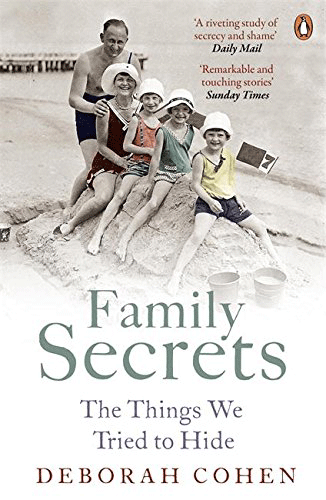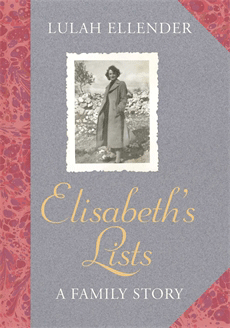 During this Suffrage commemoration year there are increasing numbers of women’s stories appearing on the shelves (hooray). Some of the most intriguing are those written by daughters or granddaughters exploring their female ancestors. They may not always be the most balanced: the relationship between mothers are daughters can be fraught. Sometimes we are too different, or too alike, to be able to step back and take a clear-eyed view. However, partial or not, they are charged with emotion and fascinating to read.
During this Suffrage commemoration year there are increasing numbers of women’s stories appearing on the shelves (hooray). Some of the most intriguing are those written by daughters or granddaughters exploring their female ancestors. They may not always be the most balanced: the relationship between mothers are daughters can be fraught. Sometimes we are too different, or too alike, to be able to step back and take a clear-eyed view. However, partial or not, they are charged with emotion and fascinating to read.
When researching women’s lives it is often useful to think a little outside the box. Of course, letters and diaries are an invaluable resource, where these exist, but sometimes the oddest objects can throw a light on life as it has been lived. This is a tack taken by Maggie Andrews in ‘A History of Women in 100 Objects’. This is one of those fascinating dip-in, dip-out books, which looks at items as diverse as a scold’s bridle and a contraceptive pill, a hat and a dinosaur fossil, and the effect they have had on shaping, confining or liberating women’s lives. Initially you may think this is a frivolous book, but actually it ranges wide and touches on a number of issues which have defined the way women lived or how women were perceived during their lifetime.
 Such an oblique entry to biography is evident in ‘Elizabeth’s Lists’. Lulah Ellender inherited a book of handwritten lists from her mother. The book itself – a small, marbled journal which belonged to Lulah’s grandmother, who had died long before Lulah herself was born – included shopping lists, lists of presents given and received, to-do memos, packing lists, and even a tally of the eggs laid by her grandmother’s hens. Elizabeth was fragile and lists were a way for her to try to gain control over her life and to cope with it, piece by piece, list by list. Lulah uses these lists to put together a picture of her grandmother throughout her tragically short life as a diplomat’s wife in China in the 1930s and later in wartime Britain. It is an absorbing voyage of discovery both for the writer and the reader. Finding out more about her grandmother clarifies Lulah’s relationship with her own mother just as she is losing her. It is a poignant and moving read.
Such an oblique entry to biography is evident in ‘Elizabeth’s Lists’. Lulah Ellender inherited a book of handwritten lists from her mother. The book itself – a small, marbled journal which belonged to Lulah’s grandmother, who had died long before Lulah herself was born – included shopping lists, lists of presents given and received, to-do memos, packing lists, and even a tally of the eggs laid by her grandmother’s hens. Elizabeth was fragile and lists were a way for her to try to gain control over her life and to cope with it, piece by piece, list by list. Lulah uses these lists to put together a picture of her grandmother throughout her tragically short life as a diplomat’s wife in China in the 1930s and later in wartime Britain. It is an absorbing voyage of discovery both for the writer and the reader. Finding out more about her grandmother clarifies Lulah’s relationship with her own mother just as she is losing her. It is a poignant and moving read.
Another woman looking into her female antecedents, this time in search of a great-aunt, is Hannah Rothschild: her quarry is the elusive and scandalous Nica. A black sheep (or should that be a dark ewe?), she is the not-so-secret skeleton in the family closet: the story everyone knows but no-one ever talks about. The sort that becomes lost to future generations. Rich and privileged, Pannonica had everything – wealth, a handsome husband, social position and loving children – until the early 1950s when, seduced by music, she became ‘the crazy Baroness bewitched by a song’ and abandoned her marriage to follow Thelonius Monk to New York. Obviously, we can’t all find stories this dramatic in our family history, but surely it is worth looking – you never know what you might find.
Tania Szabo knew, all too well, that her mother was a heroine: the young, brave and beautiful resistance fighter who was executed in Ravensbrück concentration camp. Tania admired her mother, who was one of the first women awarded the George Cross; she had seen Violette’s life immortalised in print and on screen (she was played by Virginia McKenna in the movie), but Tania was only two when her mother was shot. For much of those two years, this courageous woman had been on missions or imprisoned, so her daughter could not really know her. The biography is bittersweet. Violette sacrificed everything for her country and her conviction – but one of the things she sacrificed was Tania. ‘Young, Brave and Beautiful’ is Tania’s search for the mother she lost. It is not the best written book but it is passionate, and her devotion to her mother is there on every page.
Sometimes, in uncovering stories from the past, the researcher has to make hard decisions on what to reveal and what is perhaps best hidden. Of course all truly impartial researchers will say, with justification, tell all. Do not judge. However, if you are researching family there may be other considerations: sometimes, truly, to quote Roger McGough, ‘Discretion is the Better part of Valerie’ … Perhaps it would be better to document all but just not repeat it until some of the wounds have scabbed over, or the people most closely involved are gone. But don’t let that stop you researching and documenting. Deborah Cohen explores this conundrum in ‘Family Secrets’. She looks at choices people have made to protect family reputations and the effect this has on actions and emotions: diaries hidden in bank vaults, adoptions and divorces hidden from view, names changed, cousins (and closer connections) expunged from families and never spoken of again. It is an illuminating look at Britain’s stiff upper lip and thick net curtains that hide family secrets from the future family historian.
Make this year, with its focus on women, the year you look at the women in your own family. Start with those closest: your mother, grandmother or aunt. My mother is 90 this year and her fund of memories is priceless: playing cards in the bomb shelters while her school class sheltered from the bombs, fogs so thick that trains were cancelled and you couldn’t see six inches – let alone a foot – in front of you, celebrating VE Day in Trafalgar Square and going up to London to watch the Queen on Buckingham Palace balcony on Coronation Day… Talk to the living while you still can. Take your notebook: write it all down before it is too late.

[…] way of uncovering stories of the past. Another reader kindly drew my attention to this fascinating National Archives post by Sally Hughes about how objects as diverse as shopping lists, a scold’s bridle and dinosaur […]